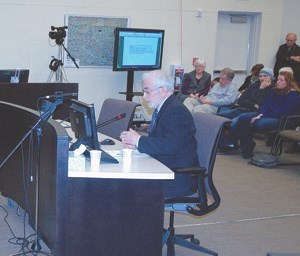The debate over removing fluoride from Okotoks’ drinking water is heating up.
About 60 people turned out to a public hearing on March 26 to hear experts speak on both sides of the fluoride issue in Okotoks and add their voices to the debate.
Medical experts squared off to lend their advice on whether town council should remove fluoride from town water. A prominent opponent of flouride discussed potential health impacts and ethical questions over the practice. On the other side, Alberta Health Services (AHS) physician, Dr. Richard Musto, spoke out in support of the practice as safe and effective in preventing tooth decay.
“AHS supports fluoridation of water as a simple, safe and cost efficient means of protecting teeth from decay,” said Musto, Alberta Health Services medical officer of health.
Musto said fluoride makes teeth more resistant to acids produced by bacteria, it reduces the ability of bacteria to produce acid it helps to repair damaged enamel. He said fluoridation of water combined with topical use provides the most effective protection.
Musto said there are volumes of research in support of the practice. He presented data from screening programs of students in the Calgary region between kindergarten and Grade 2 showing Okotoks has a lower rate of tooth decay compared to communities without flouridation in their water, such as High River and Cayley. He also cited studies from Quebec and York University which, he said, show an increase in tooth decay after fluoridation was eliminated.
Musto said scientific reviews have concluded more research needs to be done in areas where people are raising questions, but there isn’t enough scientific evidence to show a risk of fluoride at current levels.
According to Musto, fluoride levels in Okotoks range between 0.7 and 0.9 mg per litre, well below the highest acceptable concentrations of 1.5 milligrams of fluoride in drinking water allowed by Health Canada.
Musto maintained there’s no controversy over the safety of fluoridation at recommended levels.
Fluoride opponent Dr. James Beck, University of Calgary medical biophysics professor, said promoters of fluoridation are trapped in a myth that it’s a good thing.
“It’s not substantially effective, it’s not safe and it’s not ethical,” he said.
Beck said recent studies show little to no benefit for fluoridation, adding that stopping fluoridation is not a threat to dental health in the community, The main benefits from flouride, Beck explained, comes from topical use, not ingestion.
Beck said there is a potential for harm to a variety of parts of the body, including bones, thyroid, brain, cardio vascular system and kidneys, due to fluoride exposure. He said the chemical poisons the functions of enzymes in the body and hyperthyroidism is more prevalent in communities with fluoride.
“There is a substantial probability of harm, there is little or no evidence of benefit and there are alternatives that are known to be effective,” he said.
He also argued adding fluoride to water doesn’t meet medical ethical standards. He said a person should have a choice to ingest a drug and that administration should be monitored by a medical professional. While some may say fluoride is not a drug, he counters it fits the definition of a substance that is not a nutrient and is used to prevent disease. As well, he said the Supreme Court of Canada deemed fluoride a medication.
Some Okotoks residents supported the practice saying it promotes dental health in the community.
Okotoks resident Heather Avis said it’s also important to provide a source of fluoride for low-income people who can’t afford dental care.
“These are the most vulnerable people in our community,” she said.
Adding fluoride to water is not much different than wide-scale use of drugs and medical treatments, such as vaccination, to protect peoples’ health, she said.
Okotoks resident Dot Greenshields said she grew up in a community without fluoride and while she had good dental care growing up and she still ended up with cavities. By comparison, her children, who were raised in Okotoks, have had fewer cavities.
Penny Judson, Millarville resident and dental hygienist, worries there could be increased fluorosis as a result of people not using fluoride supplements properly.
Most opposed to fluoridation said it should be a choice.
“If you want to put it in,” said Judy Anne Niemi. “If you don’t want to put it in, don’t put it in.”
She is worried about the potential health effects of fluoride.
Colleen Osentis said the Town has taken away her right to choose whether she wants to ingest fluoride. She questioned whether the Town would pay for filter systems to remove fluoride for the people who don’t want it.
Town council is scheduled to make a decision on the matter on April 9.




